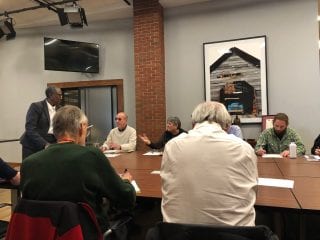by Strohmann Breeding
On a cold dreary afternoon on February 25, 2019, OLLI hosted its class titled “Mass Incarceration”.
This class was taught by Dr. Valandra, a well-known and highly qualified professor from the University of Arkansas. Dr. Valandra serves as the Director of African and African American Studies at the University of Arkansas. Her research interests include public child welfare policy and practice, gender-based violence prevention, and culturally responsive research and social work practice and policy.
As Dr. Valandra stood in front of the OLLI students inside the David Pryor center, she passed out an anonymous survey, stating, “I use what I call a ‘social justice’ lens to look at incarceration, not pointing fingers at one individual, or one issue; it’s looking at how the system operates, the trends in the system.”
Posing the question, “Why is it that we have an incarceration system that is disproportionality made up of people who live in poverty? Are we saying as a society that people who live in poverty commit more crimes?” Dr. Valandra provoked a discussion based not on political values, beliefs, or votes, but one on morals, choices and race.
The class went onto discuss voting rights for criminals, as Dr. Valandra posed the question, “What about people who have been criminally charged and are later proved innocent…policies are driven by people’s beliefs, behaviors, values and perceptions.”
“How many of you have heard the term color blindness?…It means we just see people, no colors of skin.” Dr. Valandra went on to discuss Jim Crow laws saying “There are more men of color incarcerated now than during the Jim Crow era, but we continue to promote this narrative that ‘we don’t see race’.”
Color Blindness has become a taboo phrase in 2019 as it circulated the web during the 2016 presidential campaign. Mass Incarceration has also become a recent debate among major politicians, but has long been an issue for America.
OLLI hopes to offer more courses taught by Dr. Valandra and dive deeper into racial, ethnic and religious divides to better educate our members through professionals teaching.


